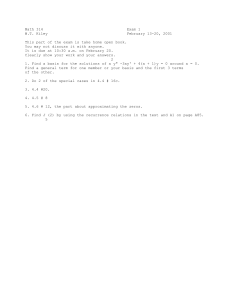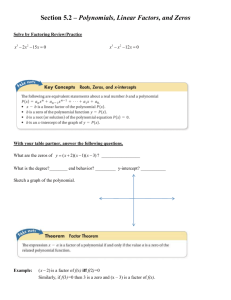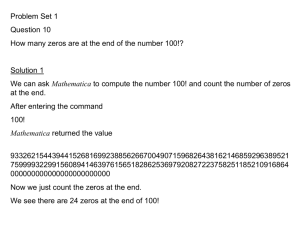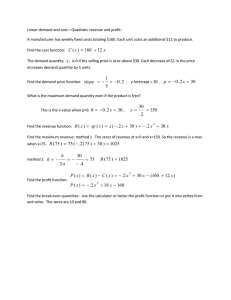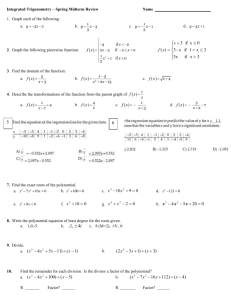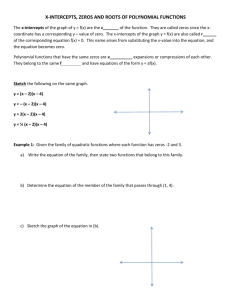� 0
advertisement
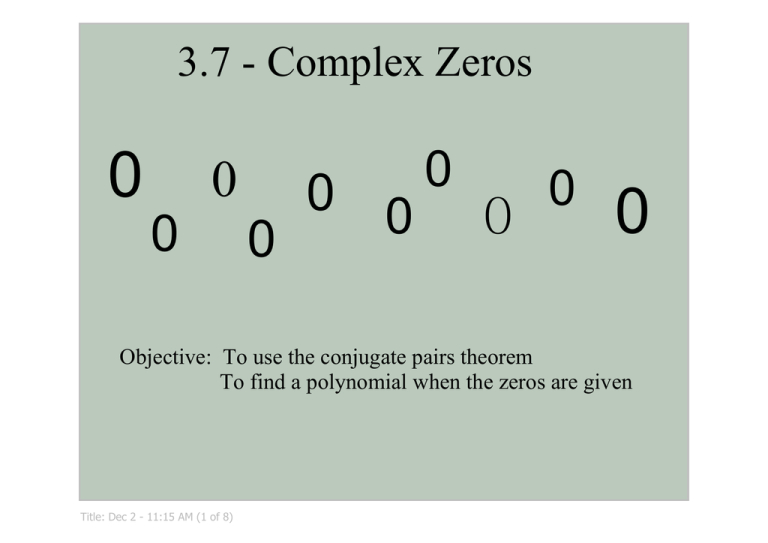
3.7 ­ Complex Zeros � 0 � � � � � 0 � � Objective: To use the conjugate pairs theorem To find a polynomial when the zeros are given Title: Dec 2 ­ 11:15 AM (1 of 8) A polynomial function of degree n will always have exactly n complex zeros. These zeros may be comprised of real, imaginary or complex numbers Title: Dec 2 ­ 11:44 AM (2 of 8) Conjugate pairs theorem Let f(x) be a polynomial whose coefficients are real numbers. If r = a + bi is a zero of f, then the complex conjugate r = a ­ bi is also a real zero of f. Example: If 3 ­ i is a zero, then 3 + i must also be a zero Title: Dec 2 ­ 11:18 AM (3 of 8) Using the given information, find the remaining zeros of f. Degree 4; zeros: 3, 4, 4 ­ i 4 + i Degree 4; zeros: i, 1 + i ­i, 1 ­ i Degree 5; zeros: 1, ­i, 2 + i i, 2 ­ i Title: Dec 2 ­ 11:16 AM (4 of 8) Form a polynomial f(x) with real coefficients having the given degree and zeros. Degree 4; zeros: 3, 4, 4 ­ i f(x) = (x ­ 3)(x ­ 4)(x ­(4 ­ i))(x ­ (4 + i)) f(x) = x4 ­ 15x3 + 85x2 ­ 215 x + 204 Title: Dec 2 ­ 11:16 AM (5 of 8) Form a polynomial f(x) with real coefficients having the given degree and zeros. Degree 4; zeros: i, 1 + i f(x) = (x ­ i)(x + i)(x ­ (1 + i))(x ­ (1 ­ i)) f(x) = x4 ­ 2x3 + 3x2 ­ 2x + 2 Title: Dec 2 ­ 11:16 AM (6 of 8) Form a polynomial f(x) with real coefficients having the given degree and zeros. Degree 5; zeros: 1, ­i, 2 + i f(x) = x5 ­ 5x4 + 10x3 ­ 10x2 + 9x ­ 5 Title: Dec 2 ­ 11:16 AM (7 of 8) Homework: pg: 237 #'s: 3­6, 8­16 evens, 17­19 Title: Dec 2 ­ 11:33 AM (8 of 8)
